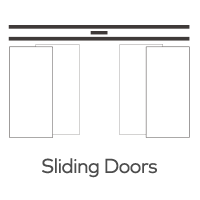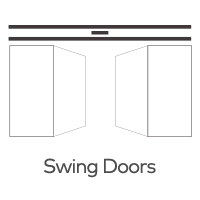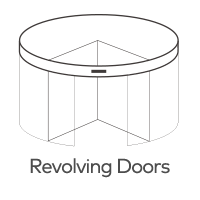What types of sensors are commonly used in automatic glass door systems, and how do they differ in functionality?
Automatic glass doors have become a ubiquitous feature in modern buildings, providing convenience, accessibility, and a touch of sophistication. Behind their seamless operation lies a range of sensors that play a pivotal role in making these doors smart and responsive. In this article, we will explore the common types of sensors used in automatic glass door systems and how they differ in functionality.

1. Infrared (IR) Motion Sensors:
Infrared motion sensors are among the most prevalent sensors used in automatic glass door systems. They detect motion by emitting infrared beams and measuring the reflection off nearby objects, such as pedestrians approaching the door. When motion is detected, the door opens. IR motion sensors are highly reliable and cost-effective, making them a popular choice for both sliding and swing glass doors.
2. Microwave Motion Sensors:
Microwave sensors use microwave radio frequencies to detect motion. They emit microwave signals and analyze the reflections to determine when someone is approaching the door. Microwave sensors are effective in various weather conditions and are especially suitable for larger entrance areas. They can offer a wider detection range compared to IR sensors but may be more expensive.
3. Ultrasonic Sensors:
Ultrasonic sensors work by emitting high-frequency sound waves and measuring the time it takes for the waves to bounce back after hitting an object. These sensors are effective at detecting both motion and stationary obstacles, providing an added layer of safety. Ultrasonic sensors are often used in revolving glass doors and are suitable for busy and complex entrance environments.
4. Touchless Sensors:
Touchless sensors have gained popularity, especially in the wake of the COVID-19 pandemic, as they offer a hands-free solution for opening glass doors. These sensors can use technologies like capacitive touch or proximity detection to trigger the door's operation when a user approaches. They are particularly common in healthcare facilities, retail stores, and public buildings.
5. Safety Sensors:
Safety sensors, such as safety curtains or beams, are designed to prevent the door from closing if an obstacle is in the door's path. They rely on various technologies, including infrared, laser, or ultrasonic, to detect obstructions and ensure the safety of users. These sensors are critical for preventing accidents, particularly in high-traffic areas.
6. RFID and Access Control Sensors:
Automatic glass doors are often integrated with access control systems using RFID (Radio-Frequency Identification) sensors. Users can gain entry by presenting RFID cards or badges, and the doors will unlock and open as necessary. These sensors enhance security and can be found in commercial and office buildings.
7. Environmental Sensors:
Environmental sensors, such as light and temperature sensors, are used to regulate the door's behavior based on external conditions. For instance, light sensors can adjust the door's opening speed or sensitivity depending on the ambient light, while temperature sensors can help conserve energy by preventing unnecessary door operation in extreme weather.
Conclusion:
Automatic glass doors have evolved to become not only symbols of modern architecture but also smart, responsive, and safe access solutions. The sensors used in these systems play a vital role in ensuring their functionality and safety. From motion and touchless sensors to safety and environmental sensors, each type serves a specific purpose, making automatic glass doors both convenient and secure for users. Understanding the differences in functionality among these sensors is crucial for designing and maintaining efficient automatic glass door systems.







